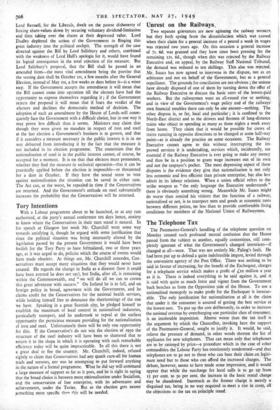Unrest on the Railways.
Two separate grievances are now agitating the railway workers, but they both spring from the dissatisfaction which was caused when their claim for a general increase of a pound a week in wages was rejected two years ago. On this occasion a general increase of 7s. 6d. was granted and they have since been pressing for the remaining 12s. 6d., though when this was rejected by the Railway Executive and, on appeal, by the Railway Staff National Tribunal, the demand was reduced to ten shillings. This also was rejected. Mr. Isaacs has now agreed to intervene in the dispute, not as an arbitrator and not on behalf of the Government, but as a general conciliator. The grounds for conciliation are not obvious ; the unions have already disposed of one of them by turning down the offer of the Railway Executive to discuss the basic rates of the lowest-paid workers. But the railwaymen want an all-round rise or nothing, and in view of the Government's wage policy and of the railways' own financial troubles there can only be one answer—nothing. The other dispute is, so far, local and particular ; it is confined to the North-East district and to the drivers and firemen of long-distance trains who object to spending as many as three nights a week away from home. They claim that it would be possible for crews of trains running in opposite directions to be changed at some half-way point—as is already the practice on some occasions. The Railway Executive cannot agree to this without interrupting the im- proved services it is undertaking, services which, incidentally, are essential if the Railway Executive is ever going to make any money and thus be in a position to grant wage increases out of its own and not the taxpayer's pocket. The most depressing aspect of these disputes is the evidence they give that nationalisation is not only less economic and less efficient than private enterprise, but also less adroit in its labour relations. When a union official refers to the strike weapon as " the only language the Executive understands " there is obviously something wrong. Meanwhile Mr. Isaacs might do worse than remind his visitors that the function of a railway, nationalised or not, is to transport men and goods at economic rates between different points, no less than to provide comfortable living conditions for members of the National Union of Railwaymen.






































 Previous page
Previous page